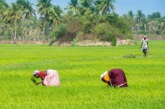Consume Organic Food
By Dr Arvind kumar
Organic foods are those that are produced without the use of chemicals, including pesticides and fertilizers commonly used in cultivation and drugs, such as antibiotics and hormones given to commercial livestock. Organic food production is a heavily regulated industry, distinct from private gardening. Currently, the European Union, the United States, Canada, Japan and many other countries require producers to obtain special certification in order to market food as “organic” within their borders. In the United States, organic production is a system that is managed in accordance with the Organic Foods Production Act (OFPA) of 1990 and regulations in Title 7, Part 205 of the Code of Federal Regulations to respond to site-specific conditions by integrating cultural, biological, and mechanical practices that foster cycling of resources, promote ecological balance, and conserve biodiversity.
Processed organic food usually contains only organic ingredients. If non-organic ingredients are present, at least a certain percentage of the food’s total plant and animal ingredients must be organic (95% in the United States, Canada, and Australia) and any non-organically produced ingredients are subject to various agricultural requirements. Foods claiming to be organic must be free of artificial food additives, and are often processed with fewer artificial methods, materials and conditions, such as chemical ripening, food irradiation, and genetically modified ingredients. Pesticides are allowed so long as they are not synthetic.
Several surveys and studies have attempted to examine and compare conventional and organic systems of farming. The general consensus across these surveys is that organic farming is less damaging for the following reasons:
v Organic farms do not consume or release synthetic pesticides into the environment—some of which have the potential to harm soil, water and local terrestrial and aquatic wildlife.
v Organic farms are better than conventional farms at sustaining diverse ecosystems, i.e., populations of plants and insects, as well as animals.
v When calculated either per unit area or per unit of yield, organic farms use less energy and produce less waste, e.g., waste such as packaging materials for chemicals.



